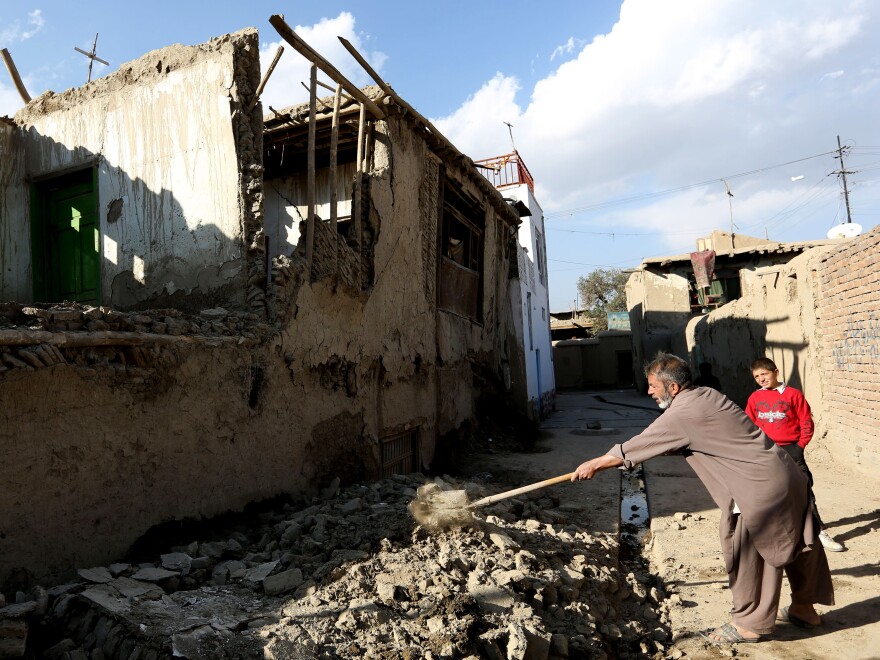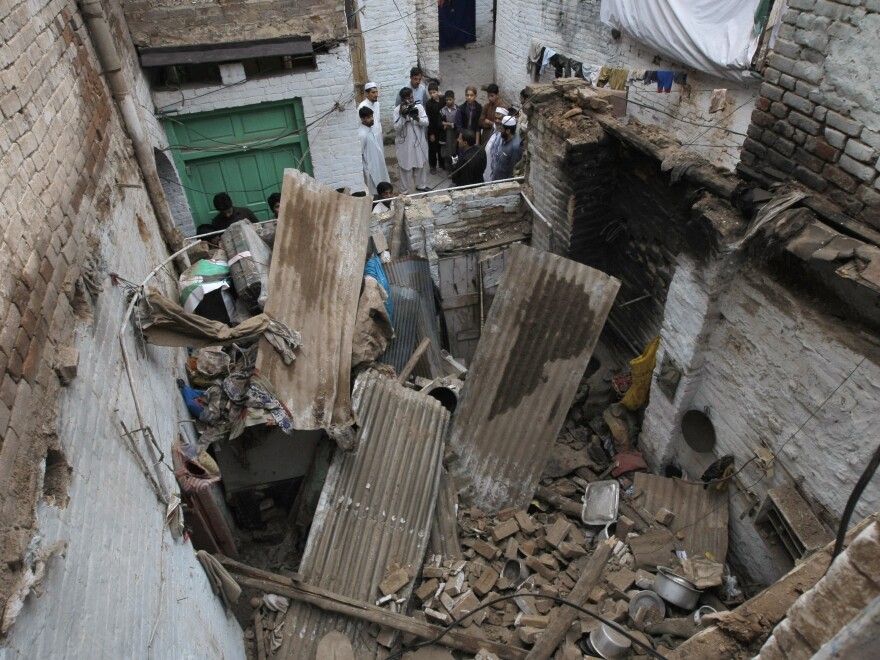Updated at 7:24 p.m. ET
The death toll continues to climb from the massive earthquake that rocked northeast Afghanistan near its border with Pakistan. More than 260 people are confirmed dead across the region with the majority of the reported casualties in Pakistan.
The epicenter of the magnitude 7.5 earthquake struck a remote area of Afghanistan but could be felt across the region as far north as Tajikistan and as far south as India.
The Associated Press reports that in Kabul, Afghanistan, buildings trembled for up to 45 seconds causing walls to crack and vehicles to roll down the streets. The AP adds:
"At least 228 people were killed in Pakistan, with more than 1,000 injured, while Afghan officials reported 33 dead and more than 200 injured, and authorities in the Indian-controlled Kashmir region reported two deaths. Officials expected the casualty toll to rise as they reached the remote areas.
"Authorities struggled to reach the hardest-hit areas in Afghanistan near the epicenter, located 73 kilometers (45 miles) south of Fayzabad, the capital of Badakhshan province."
The U.S. Geological Survey says that structures in the region are "highly vulnerable to earthquake shaking, though some resistant structures exist." It also reports most of the at-risk structures are "adobe block and unreinforced brick with timber floor construction."

The death toll could climb in the days to come, according to Reuters, because "communications were down in much of the rugged Hindu Kush mountain range where the quake was centered." The Reuters report continues:
"Shockwaves were felt in New Delhi in northern India and across northern Pakistan, where hundreds of people ran out of buildings as the ground rolled beneath them. No deaths were reported in India.
" 'We were very scared ... We saw people leaving buildings, and we were remembering our God,' Pakistani journalist Zubair Khan said by telephone from the Swat Valley northwest of the capital Islamabad.
" 'I was in my car and, when I stopped my car, the car itself was shaking as if someone was pushing it back and forth. '"
NPR's Philip Reeves, reporting from Kabul, filed this report on damage from the earthquake, said to be mostly in northern Afghanistan and northwest Pakistan.
"In one Afghan town, 12 school girls died trying to escape a building via a stairway. In Pakistan, TV footage shows cracked buildings, houses with missing roofs, cars crashed by trees, and injured people crowding into hospitals.
"This quake struck in a remote area and, in many places, cut power and communications, so the full picture's far from clear. Concern's particularly focusing on villages in the mountains of the Hindu Kush, where after recent rain and snow, there's a risk of landslides."
White House Press Secretary Josh Earnest told reporters during the daily briefing on Monday that the United States is prepared to help if asked.
"The U.S. government has been in touch with the governments in Afghanistan and Pakistan and we stand ready to provide any additional support that may be needed," Earnest said.
Earlier Monday, India Prime Minister Narendra Modi tweeted, "I pray for everyone's safety." He also said via Twitter that he spoke with both Afghan President Ashraf Ghani and Pakistani Prime Minister Nawaz Sharif. Modi said he offered Pakistan "all possible assistance from India."
Heard about strong earthquake in Afghanistan-Pakistan region whose tremors have been felt in parts of India. I pray for everyone's safety.
— Narendra Modi (@narendramodi) October 26, 2015
Spoke to PM Nawaz Sharif & expressed condolences on the loss of lives due to the quake. Offered all possible assistance from India.
— Narendra Modi (@narendramodi) October 26, 2015
The Hindustan Times reports:
"Modi reached out to Pakistan despite the frosty relations between the two countries and the renewed cross-border firing by Pakistan in which one civilian has been killed in Jammu and Kashmir and several others injured, besides leading to a scare in the border villages.
...
"Pakistan's information minister Pervez Rashid, meanwhile, told a news conference Pakistan will not issue any appeals to the international community for help as the country has the required resources to carry out the rescue and relief work. He also thanked neighboring India for offering support to Islamabad for the quake victims.
"He said Pakistani civil and military authorities were trying their best to reach those affected by the quake."
According to the USGS, the temblor was "approximately 210 km [132 miles] below the Hindu Kush Range in northeastern Afghanistan." The epicenter was some 150 miles from the Afghan capital city of Kabul.

The BBC says that:
"In the city of Karimabad [Pakistan], in Gilgit-Baltistan, a witness who gave his name as Anas told the BBC that the quake had sent a landslide crashing into the Hunza river.
" 'At first it was as if someone was shaking us. There were about 20 of us and we just held on to each other,' he said.
" 'Right after that we saw a major landslide. Some people say it was a glacier that came down, some people say it was a hill. It fell right in front of our eyes.' "
The Guardian reports elsewhere in Pakistani, the isolated village of Chitral, near the Afghan border, was hard hit and at least a dozen people were killed.
"Among the dead were passengers travelling to a wedding when their four-wheel-drive vehicle was hit by falling boulders from the steep mountainsides.
" 'In Chitral it was just so shocking – we are so close to the epicentre,' said Asadullah Ghalib, a Chitral resident. "There have been landslides, extensive damage to infrastructure and a lot of old houses have been completely damaged."
Geophysicist Amy Vaughan of the USGS tells NPR's Newscast desk that the region is "very seismically active," noting that this is where the Eurasian and Indian plates converge.
Philip says that Monday's quake hit nearly a decade after a temblor that killed tens of thousands of people in the region:
"South Asians haven't forgotten the earthquake 10 years ago in the Himalayan Mountains in which more than 70,000 people — many of them Pakistanis — were killed, and many more were made homeless. That quake had a magnitude of 7.6."
Copyright 2021 NPR. To see more, visit https://www.npr.org.




